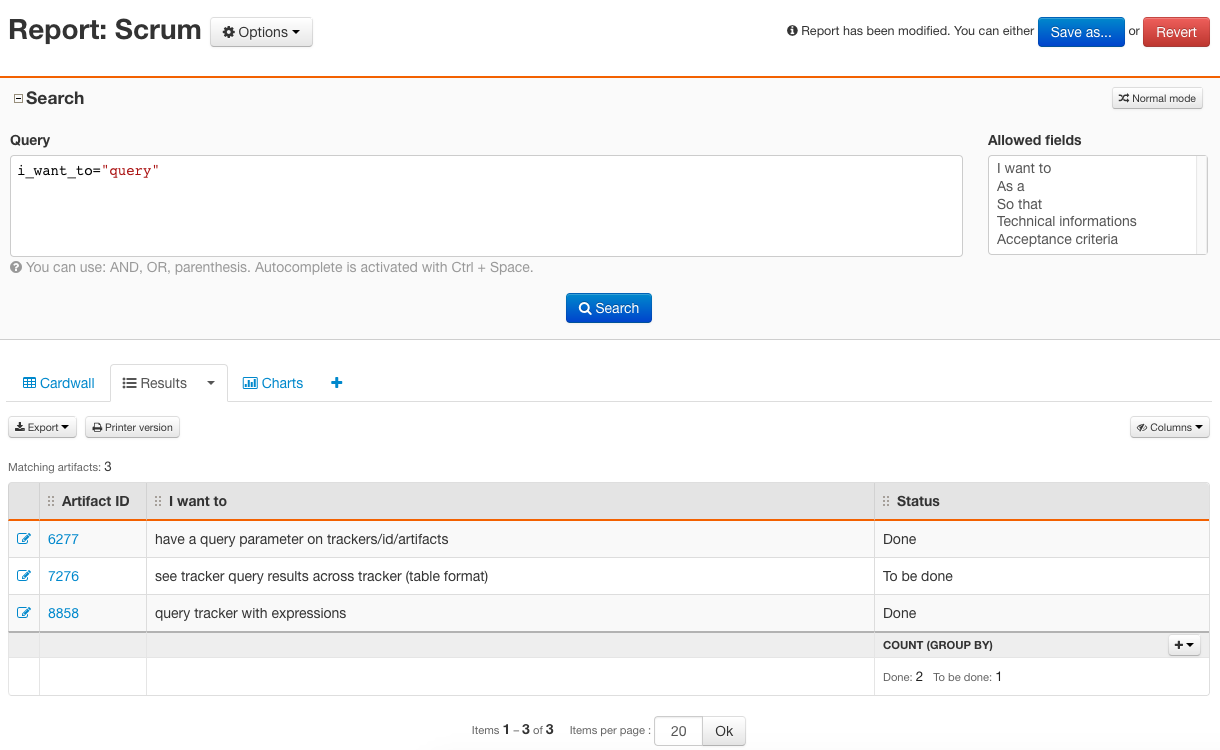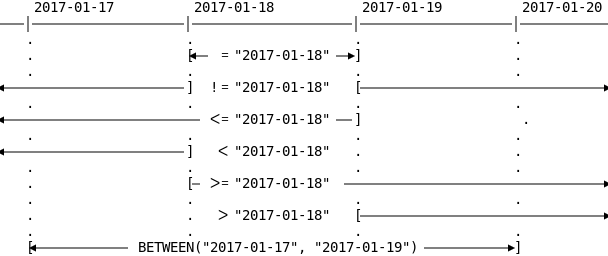Tuleap Query Language (TQL)¶
The Tuleap Query Language is a pseudo-language to search items in the platform. As of today only artifacts in trackers can be retrieved.
TQL on reports¶
TQL can be used in “Expert” mode on tracker’s reports in the search area. The saving of the query matches the usual saving of the report.

Tuleap Query Language on reports
Queries¶
Currently, the language supports:
- Logical operators:
AND,OR - Parenthesis to force precedence
- Comparison operators:
- For string, text, files, and @comments:
=,!= - For date, integer and float fields:
=,!=,<,<=,>,>=,BETWEEN() - For list fields:
=,!=,IN(),NOT IN()
- For string, text, files, and @comments:
- Comparison values:
- For string, text, and files fields:
string - For integer fields:
stringconvertible to integer,integer - For float fields:
stringconvertible to float,integer,float - For date fields:
stringconvertible to date,NOW() - For list fields:
allmatching list bind values - For list fields bound to users:
stringusing user names,MYSELF() - For list fields bound to user groups:
stringmatching either the name of a user-defined (“Static”) user group (e.g."Customers") or matching the translated system-defined (“Dynamic”) user group name (e.g."Project members"). - For @comments:
string
- For string, text, and files fields:
- Dynamic value for date fields:
NOW().start_date > NOW()matches all artifacts where start_date is greater than the current time (time when the query is displayed).- You can use interval periods with NOW(), for example
submitted_on > NOW() - 1mwill matches all artifacts that have been created during the last month. The supported specificators are: years (y), months (m), weeks (w) and days (d).
- Dynamic value for list fields bound to users:
MYSELF().assigned_to = MYSELF()matches all artifacts where assigned_to is equal to the current user.
- Search in comments:
@comments = 'Lorem ipsum'matches all artifacts where at least one follow-up comment contains the stringlorem ipsum@comments = ''returns the list of artifacts without any comments@comments != ''returns the list of artifacts with at least one comment- When searching in comments, you should be aware of some limitations:
- Searches are done for words longer than 3 characters
- Some words are not taken in account because they are too common (like
the,a, …)
- Search in files:
attachment = 'minutes'matches all artifacts where there is at least one attached file with the filename “Minutes-20180101.docx” or the description “Minutes of last meeting” contains the stringminutesattachment != 'minutes'matches all artifacts where there isn’t any attached files with filename or description containingminutes.attachment = ''matches all artifacts without any attached filesattachment != ''matches all artifacts that have at least one attached file
To construct a query you can combine all these elements.
Query example:
(summary = "soap" OR summary = "rest")
AND description = "documentation" AND story_points BETWEEN(3, 8)
Note
Be careful, you must use the name of fields and not the label to construct queries.
Sending the query to the server can throw the following errors:
- The query syntax is incorrect (e.g. if you forget a closing quote)
- The name doesn’t match any existing field name
- The value is not defined for the list field (e.g.
assigned_to = "non_existent_user") - The dynamic value is not supported for this field (e.g.
text_field = NOW()) - The comparison operator is not supported for this field (e.g.
list_field >= 3) - The empty value is not allowed for this comparison (e.g.
date_field BETWEEN("", "2017-01-18")) - The query uses MYSELF() and the current user is not logged in (when browsing a Tuleap platform as an anonymous user)
- The field type is unsupported
- The query is too complex
Important
The query is too complex when it exceeds a limit. This limit is defined by SiteAdministrators on SiteAdmin > Tracker > Report.
Pro-tips¶
For a better usability in building query there is a syntax highlighting
and an auto-completion (ctrl+space on field names).

Highlighting and auto-completion
Moreover to know allowed fields there is a select box with all usable fields. If you click on one of them the field’s name is introduced in the query.

Allowed fields
Date operators¶
When searching on date fields using TQL, you should be aware of the sometimes subtle differences between the various operators. We have found this diagram helpful. Here, we use all available operators supporting date fields and a given date (“2017-01-18”) and represent the period that will be selected as a result. For example, date_field > "2017-01-18" means date_field is later than 2017-01-18 23:59:59, while date_field >= "2017-01-18" means date_field is later than or equal to 2017-01-18 00:00:00

Explanation of date operators
TQL on cross-tracker search¶
Attention
This module is part of Tuleap Entreprise. It might not be available on your installation of Tuleap.
TQL can also be used in the cross-tracker widget, in the search area.
TQL on cross-tracker search
Semantics and some dynamic fields such as the Submission date (“Submitted On”) can be used to search on multiple trackers. The following keywords are supported:
- String/Text semantics:
@title: the “Title” semantic. It behaves like a string field.@description: the “Description” semantic. It behaves like a text field.
- Dates:
@submitted_on: the “Submitted On” dynamic field. It behaves like a date field, but the empty string''is not allowed (this field cannot be empty).@last_update_date: the “Last Update Date” dynamic field. It behaves like a date field, but the empty string''is not allowed (this field cannot be empty).
- Lists:
@status: the “Status” semantic. It behaves like a list, but can only be compared toOPEN()
- Lists bound to users:
@submitted_by: the “Submitted By” dynamic field. It behaves like a list and can have only a single value at a time.@last_update_by: the “Last Updated by” dynamic field. It behaves like a list and can have only a single value at a time.@assigned_to: the “Contributor/assignee”`` semantic. It behaves like a list and can have multiple values at a time (multiple users assigned to an artifact).
Preconditions for multi-tracker search¶
When you use a semantic, all selected trackers must have it configured and all fields linked to the semantic must be readable by the current user.
For example, if you run an expert query containing @status, all selected trackers must have defined a “Status” semantic and the “Status” field must be readable by the user viewing the widget.
If one of the trackers does not define the “Status” semantic, it will cause an error to be shown. The same is true for permissions: if one of the “Status” fields is not readable by the current user, an error will be displayed.
When you use a dynamic field, for all selected trackers it must be added in the tracker and it must be readable by the current user.
- Supported dynamic fields are the following:
- “Submitted On”: The creation date of the artifact.
- “Submitted By”: The user who first created the artifact.
- “Last Updated Date”: The date of the last change to the artifact.
- “Last Updated By”: The user who made the last change to the artifact.
For example, if you run an expert query containing @last_update_date, all selected trackers must have a “Last update date” field and that field must be readable by the user viewing the widget.
If one of the trackers does not have a “Last update date” field, it will cause an error to be shown. The same is true for permissions: if one of the “Last update date” fields is not readable by the current user, an error will be displayed.
Queries¶
Currently, the query supports:
Logical operators:
AND,ORParenthesis to force precedence
Supported comparisons:
- For @title and @description:
=,!= - For @status:
= OPEN(),!= OPEN().OPEN()is the only supported value. - For @submitted_on and @last_update_date:
=,!=,<,<=,>,>=,BETWEEN(). - For @submitted_by and @last_update_by:
=,!=,IN(),NOT IN().
- For @title and @description:
Comparison values:
- For @title and @description:
string - For @status:
OPEN()is the only supported value - For @submitted_on and @last_update_date:
stringconvertible to date,NOW()and dynamic values based onNOW(). For example:NOW() -1m,NOW() -6w, … - For @submitted_on and @last_update_date: the empty string
''cannot be used. Those fields always have a value, therefore the comparison to “empty” is not useful. - For @submitted_by, @last_update_by and @assigned_to:
stringmatching a user,MYSELF()
Example:
@title = 'documentation' AND @status = OPEN() AND @last_update_date > NOW() - 1w //Returns all open artifacts with 'documentation' in the title that have been //updated during the last week. @title = 'documentation' AND @submitted_by = 'alice' AND @assigned_to IN (MYSELF(), 'charles') //Returns all artifacts with 'documentation' in the title that have been submitted //by user 'alice' and are assigned to the viewing user (for example 'bob') //or user 'charles'.
- For @title and @description: